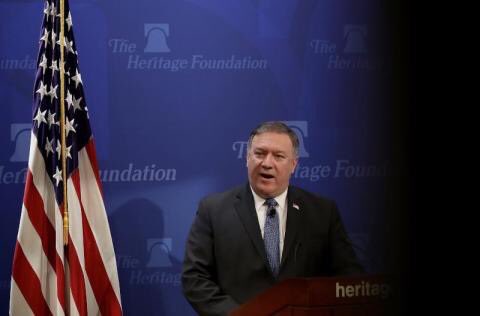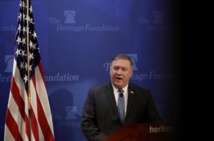"The leaders in Tehran will have no doubt about our seriousness," he said in a speech in Washington on Monday, two weeks after President Donald Trump announced his decision to cancel US participation in the 2015 Joint Comprehensive Plan of Action (JCPOA).
Pompeo also laid out a number of demands that Tehran would have to meet including halting support for terrorism, such as for the Hezbollah militia in Lebanon and Houthi rebels in Yemen, and withdrawing all its forces from Syria.
He said that US sanctions, suspended under the nuclear deal, would be restored over the next five months and that Iran must stop developing its ballistic missile programme.
"The Iranian regime should know that this is just the beginning," Pompeo said.
Iranian President Hassan Rowhani shot back at Pompeo several hours later, saying Washington had no right to make decisions for his country.
"All world countries want independence in their decisions, and the Americans may advance their agenda in some places through pressure, but logic does not accept them making decisions for the world," Rowhani was quoted as saying by state broadcaster Press TV.
"Who are you to decide for Iran and the world?" Rowhani asked.
Foreign Minister Mohammad Javad Zarif referred to Pompeo's new policy towards his country as "a regression to old habits ... it repeats the same wrong choices and will thus reap the same ill rewards."
In a Twitter post, Zarif charged that Washington was "imprisoned by delusions, failed policies [and] dictated by corrupt special interest."
Pompeo, who gave the speech at the Heritage Foundation, a conservative think tank, consulted the foreign ministers of Germany, France and Britain - the European participants in the deal - in preparing the Iran policy, the State Department said.
China and Russia are the other countries in the deal. All remaining participants have pledged to stay in the agreement even without US support.
Pompeo described the agreement as a mistaken gamble.
"The bet that the JCPOA would increase Middle East stability was a bad one for America, for Europe, for the Middle East and indeed for the entire world," he said. "It is clear that the JCPOA has not ended Iran's nuclear ambitions, nor did it deter its quest for regional hegemony."
US strategy toward Iran "will now be executed outside of the JCPOA," Pompeo said.
"We'll continue to work with allies to counter the Iranians' destabilizing activities in the region, block their financing of terror and address Iran's proliferation of missiles and other advanced weapons systems that threaten peace and stability," he said.
Pompeo said that any new agreement must ensure that Iran has "no path to a nuclear weapon - not now, not ever."
He said the US would "deter Iranian aggression," by measures including protecting transport routes and countering cyberactivity.
Washington practises "tireless" advocacy for the Iranian people, who are "deeply frustrated" with their own government's decisions, Pompeo said.
"Our demands from Iran aren't unreasonable. Give up your programme. End it," Pompeo said. "Should they choose to go back, should they begin to enrich [uranium], we're fully prepared to respond to that as well. I'm certainly not going to share with you today precisely what our response will be."
Pompeo also laid out a number of demands that Tehran would have to meet including halting support for terrorism, such as for the Hezbollah militia in Lebanon and Houthi rebels in Yemen, and withdrawing all its forces from Syria.
He said that US sanctions, suspended under the nuclear deal, would be restored over the next five months and that Iran must stop developing its ballistic missile programme.
"The Iranian regime should know that this is just the beginning," Pompeo said.
Iranian President Hassan Rowhani shot back at Pompeo several hours later, saying Washington had no right to make decisions for his country.
"All world countries want independence in their decisions, and the Americans may advance their agenda in some places through pressure, but logic does not accept them making decisions for the world," Rowhani was quoted as saying by state broadcaster Press TV.
"Who are you to decide for Iran and the world?" Rowhani asked.
Foreign Minister Mohammad Javad Zarif referred to Pompeo's new policy towards his country as "a regression to old habits ... it repeats the same wrong choices and will thus reap the same ill rewards."
In a Twitter post, Zarif charged that Washington was "imprisoned by delusions, failed policies [and] dictated by corrupt special interest."
Pompeo, who gave the speech at the Heritage Foundation, a conservative think tank, consulted the foreign ministers of Germany, France and Britain - the European participants in the deal - in preparing the Iran policy, the State Department said.
China and Russia are the other countries in the deal. All remaining participants have pledged to stay in the agreement even without US support.
Pompeo described the agreement as a mistaken gamble.
"The bet that the JCPOA would increase Middle East stability was a bad one for America, for Europe, for the Middle East and indeed for the entire world," he said. "It is clear that the JCPOA has not ended Iran's nuclear ambitions, nor did it deter its quest for regional hegemony."
US strategy toward Iran "will now be executed outside of the JCPOA," Pompeo said.
"We'll continue to work with allies to counter the Iranians' destabilizing activities in the region, block their financing of terror and address Iran's proliferation of missiles and other advanced weapons systems that threaten peace and stability," he said.
Pompeo said that any new agreement must ensure that Iran has "no path to a nuclear weapon - not now, not ever."
He said the US would "deter Iranian aggression," by measures including protecting transport routes and countering cyberactivity.
Washington practises "tireless" advocacy for the Iranian people, who are "deeply frustrated" with their own government's decisions, Pompeo said.
"Our demands from Iran aren't unreasonable. Give up your programme. End it," Pompeo said. "Should they choose to go back, should they begin to enrich [uranium], we're fully prepared to respond to that as well. I'm certainly not going to share with you today precisely what our response will be."









 Home
Home Politics
Politics











